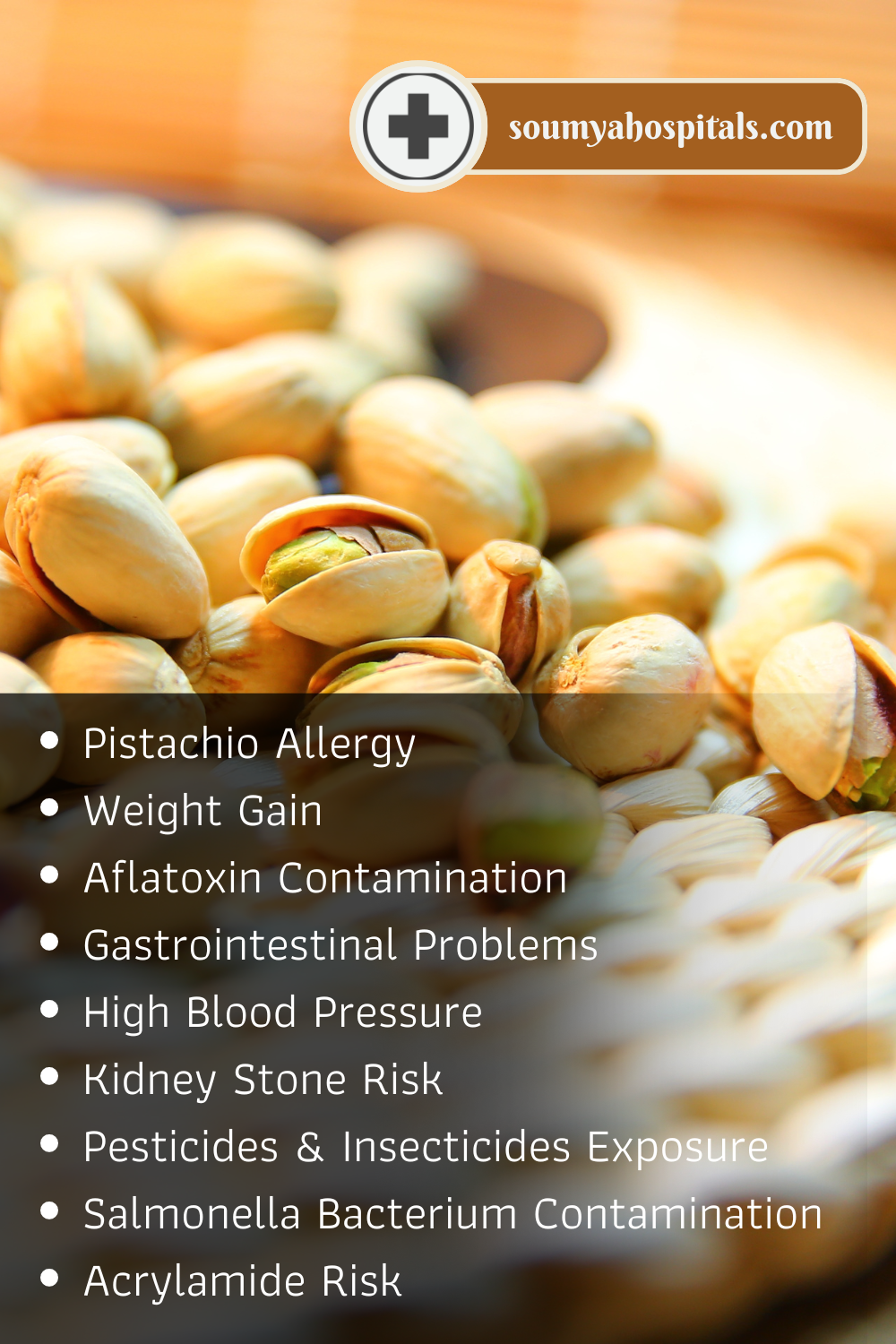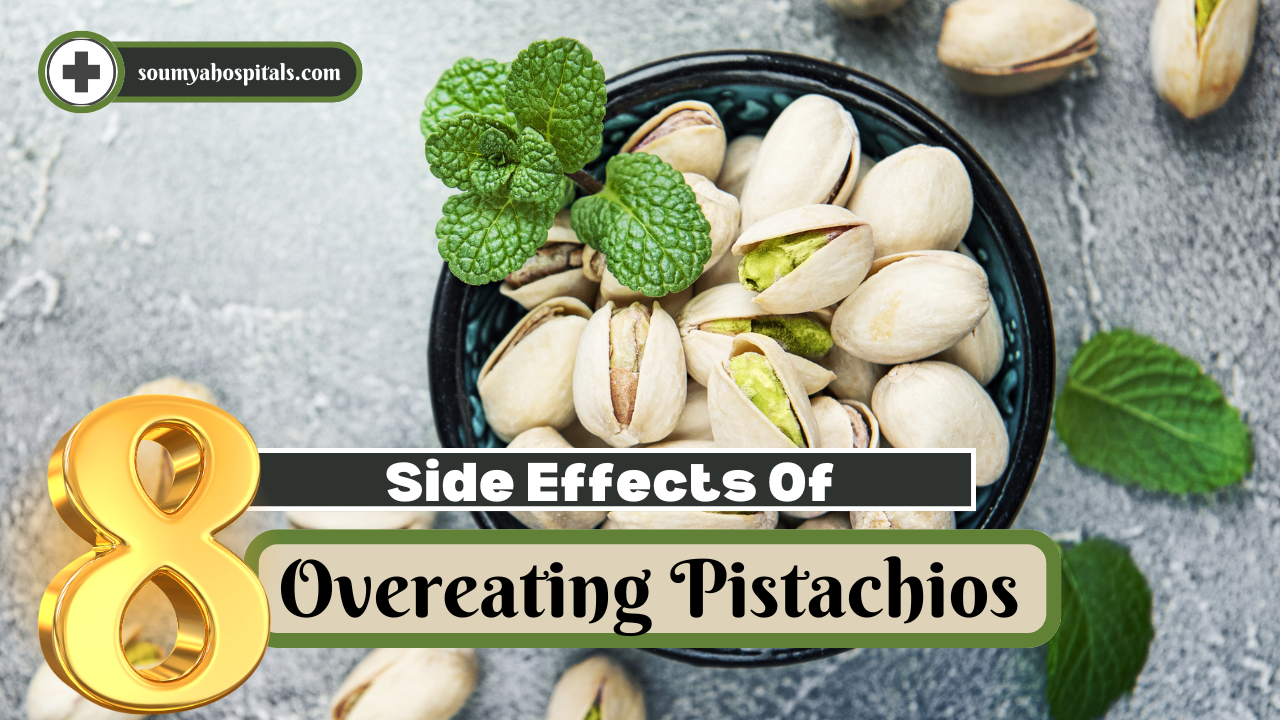The pistachio or pista is a healthy nut and is a member of the cashew family. Pistachios are rich in nutrients like vitamins, minerals, essential fatty acids, and others which benefit your health. “A handful of pistachio nuts a day could protect your heart.” However, having too many pistachios can have adverse effects on your health.
Also read: Side Effects Of Neem
1. Pistachio Allergy
If an individual is allergic to pistachio it will be evident during the early stages of their lives and will persist throughout their lifetime. Rashes and itchy skin are the most common symptoms of pistachio allergy. Other symptoms include itchy and watery eyes, sneezing, and coughing. Some may develop hives or asthma symptoms. Severe allergic reactions include the life-threatening anaphylaxis, which must be treated immediately.
2. Weight Gain
The high protein and fiber content in pistachio nuts make them a convenient and popular snack for people to munch on. Thus, eating a handful of these nuts can lead to weight gain. Consuming a cup full of pistachio nuts would mean that you have consumed close to 700 calories! Too much of anything is not good; therefore, don’t eat them in excess.
3. Aflatoxin Contamination
Aflatoxins are poisonous and cancer-causing chemicals produced by certain molds. They are usually found in improperly stored foods, including cassava, chili peppers, corn, cottonseed, millet, peanuts, rice, sesame seeds, sorghum, sunflower seeds, tree nuts, wheat, and others. A study has reported that pistachio nuts are critically contaminated with aflatoxin from the maturity stage. Pistachio nuts split naturally and those that are poorly protected can be easily invaded by insects and molds, making way for aflatoxins to contaminate them.
4. Gastrointestinal Problems
People intolerant to fructans should avoid pistachio nuts. Fructans are naturally occurring carbohydrates found in a variety of food. Foods that are high in fructans may include onions, shallots, garlic, barley, cabbage, broccoli, pistachio, artichoke, chicory root, and asparagus. Fructans are not dangerous, but those who have a low tolerance to fructans can face gastric issues when consuming pistachio. It can cause bloating, diarrhea, constipation, and abdominal pain.
5. High Blood Pressure
Natural pistachio nuts are low in sodium level. However, roasted pistachio nuts, often salted, have higher levels of sodium than usual. Consuming roasted pistachio nuts in large amounts can increase your sodium intake, thereby increasing your blood pressure.

6. Kidney Stone Risk
Pistachios contain a moderate amount of oxalates and methionine. By consuming large quantities of pistachios, you may put yourself at a risk of developing calcium oxalate and cystine kidney stones.
Pistachios are also a rich source of potassium which, in large amounts, can cause adverse effects to the body. In addition, if you are already suffering from a kidney disease, you should not overeat pistachios as it may lead to an excess of potassium in the body that the kidneys may fail to eliminate. Excess potassium may give rise to other problems including nausea, weakness, slow pulse, irregular heartbeat, heart failure, dehydration, Addison’s disease, and internal bleeding.
7. Pesticides And Insecticides Exposure
Pistachios are exposed to insecticides and pesticides to protect them from being infested by insects or pests. While these chemicals may protect the nuts from insects, they are bad for our health. Consuming pistachios that are overexposed to these chemicals can cause reactions in our body like vomiting, diarrhea, nausea, and other allergic reactions.
8. Salmonella Bacterium Contamination
Another health risk of eating too many pistachios is the exposure to salmonella bacterium. This bacterium contaminates pistachios and consuming the contaminated nuts may cause diarrhea. This bacterium can be avoided by roasting the nuts correctly. This may be fatal for infants, older individuals, and those who have a weak immune system.
9. Acrylamide Risk
Roasting pistachios is an effective way to reduce the contamination due to salmonella bacterium and aflatoxin. However, this may give rise to acrylamides. Acrylamide is a probable carcinogen that may increase the risk of cancer in humans. However, there is no solid evidence to support the association between roasted pistachios and cancer.
Now that you are aware of the side effects of eating too many pistachios, try to limit the number to 5–7 pistachios every day.
